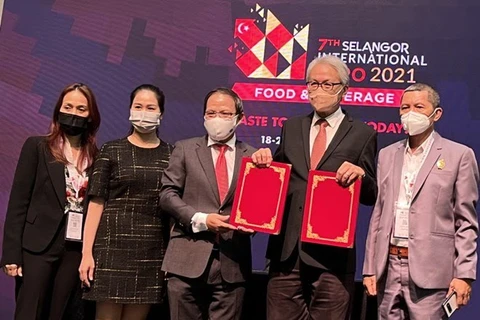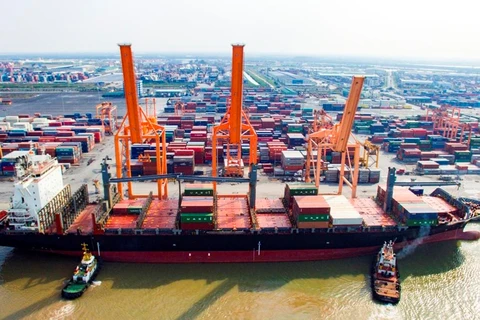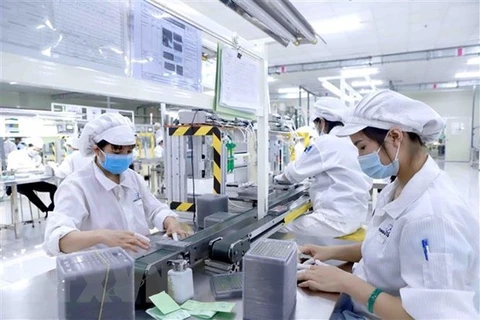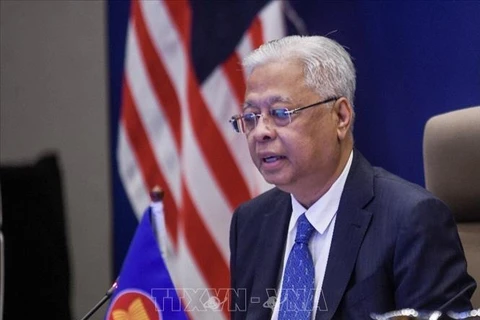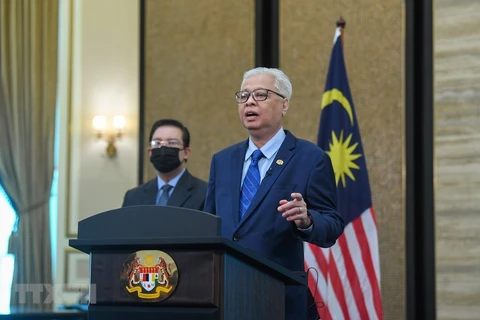Hanoi (VNA) – The official visit to Vietnam by Malaysian Prime Minister Dato’ Sri Ismail Sabri bin Yaakob on March 20 - 21 is expected to help intensify the two countries’ strategic partnership in a more substantive manner.
The trip, to be made at the invitation of PM Pham Minh Chinh, will be the first tour of Vietnam by the Malaysian leader since he took office in August 2021.
The two countries established diplomatic ties on March 30, 1973, and elevated their relations to a strategic partnership in August 2015.
Over the past years, they have frequently organised mutual visits and high-level meetings, including the visits to Vietnam by Sultan Muhammad V in March 2009 and September 2013, PM Najib Tun Razak in April 2014, and PM Mahathir Mohamad in August 2019; along with the trips to Malaysia by President Truong Tan Sang in September 2011 and PM Nguyen Tan Dung in August 2015.
High-level meetings have been held in flexible forms such as talks over the phone and via videoconference since 2020 despite the COVID-19 pandemic.
Some bilateral cooperation mechanisms have been carried out effectively, including the joint committee for economic, scientific, and technical cooperation, the defence cooperation committee, the join trade committee, and the scientific and technological cooperation committee.
Defence ties have been maintained through all-level delegation exchanges, personnel training, and experience sharing. Meanwhile, security cooperation has continually been enhanced as seen in increased sharing of information about terrorism, cybercrime, and transnational crime, along with an agreement on cooperation in transnational crime prevention and control signed in 2015.
In 2021, Malaysia ranked second in ASEAN and ninth in the world among the trade partners of Vietnam, which in turn was the third largest trade partner of the former. Bilateral trade reached 12.5 billion USD last year, up 25.3 percent from 2020. Vietnam exports mainly telephones and components, crude oil, rice coffee, and seafood to Malaysia while importing mostly computers, electronic products, machinery, equipment, petrol, household appliances and components, and chemicals. Their trade value approximated 2.2 billion USD in the first two months of 2022, up 20 percent year on year.
In terms of investment, Malaysia currently ranks second among the ASEAN nations and 10th among the 140 countries and territories investing in Vietnam, with 668 valid projects worth 13 billion USD. Vietnam has 21 valid projects with registered capital totaling 853 million USD in Malaysia, making the latter the ninth biggest among the 78 overseas investment destinations of Vietnam.
There are more than 1,000 Vietnamese students in Malaysia at present. The two sides signed a memorandum of understanding on educational cooperation on March 6, 2019, and an agreement on tourism partnership in 1994. Since visa exemption was applied to ordinary passport holders of the two countries in September 2001, the number of Malaysian tourists to Vietnam has grown fast, topping 605,000 arrivals in 2019, rising 12.2 percent from the previous year.
About 29,000 Vietnamese people are living in Malaysia, most of them manual workers.
Over the last couple of years, facing the COVID-19 outbreak, the two sides have made joint efforts to cope with the pandemic. Vietnam donated 6,500 sets of personal protective equipment worth 50,000 USD and 20,000 medical face masks to Malaysia.
Neermal Shunmugam, Chargé d’ affaires of the Malaysia Embassy in Vietnam, said the visit by PM Dato’ Sri Ismail Sabri bin Yaakob aims to further enhance post-pandemic cooperation and also provides a chance for both sides to explore new aspects of bilateral ties, discuss regional and international issues of common concern, and promote bilateral trade and investment.
Highlighting the trip’s significance, Vietnamese Ambassador to Malaysia Tran Viet Thai expressed his hope that the visit will not only set up good personal relations between the countries’ leaders but also open up numerous opportunities for substantive cooperation and strengthen ties between their peoples, businesses, and governments.
After two years of the countries’ border shutdown to cope with the pandemic, Vietnam and Malaysia are set to recognise each other’s vaccination certificates and fully reopen borders to facilitate bilateral travel, exchange, and business connections. This will be a great chance for their enterprises, investors, workers, and students to come back to the other countru, thereby continuing to foster extensive and dynamic cooperation and generating more chances for lifting the Vietnam - Malaysia strategic partnership to a new height, according to Thai./.
The trip, to be made at the invitation of PM Pham Minh Chinh, will be the first tour of Vietnam by the Malaysian leader since he took office in August 2021.
The two countries established diplomatic ties on March 30, 1973, and elevated their relations to a strategic partnership in August 2015.
Over the past years, they have frequently organised mutual visits and high-level meetings, including the visits to Vietnam by Sultan Muhammad V in March 2009 and September 2013, PM Najib Tun Razak in April 2014, and PM Mahathir Mohamad in August 2019; along with the trips to Malaysia by President Truong Tan Sang in September 2011 and PM Nguyen Tan Dung in August 2015.
High-level meetings have been held in flexible forms such as talks over the phone and via videoconference since 2020 despite the COVID-19 pandemic.
Some bilateral cooperation mechanisms have been carried out effectively, including the joint committee for economic, scientific, and technical cooperation, the defence cooperation committee, the join trade committee, and the scientific and technological cooperation committee.
Defence ties have been maintained through all-level delegation exchanges, personnel training, and experience sharing. Meanwhile, security cooperation has continually been enhanced as seen in increased sharing of information about terrorism, cybercrime, and transnational crime, along with an agreement on cooperation in transnational crime prevention and control signed in 2015.
In 2021, Malaysia ranked second in ASEAN and ninth in the world among the trade partners of Vietnam, which in turn was the third largest trade partner of the former. Bilateral trade reached 12.5 billion USD last year, up 25.3 percent from 2020. Vietnam exports mainly telephones and components, crude oil, rice coffee, and seafood to Malaysia while importing mostly computers, electronic products, machinery, equipment, petrol, household appliances and components, and chemicals. Their trade value approximated 2.2 billion USD in the first two months of 2022, up 20 percent year on year.
In terms of investment, Malaysia currently ranks second among the ASEAN nations and 10th among the 140 countries and territories investing in Vietnam, with 668 valid projects worth 13 billion USD. Vietnam has 21 valid projects with registered capital totaling 853 million USD in Malaysia, making the latter the ninth biggest among the 78 overseas investment destinations of Vietnam.
There are more than 1,000 Vietnamese students in Malaysia at present. The two sides signed a memorandum of understanding on educational cooperation on March 6, 2019, and an agreement on tourism partnership in 1994. Since visa exemption was applied to ordinary passport holders of the two countries in September 2001, the number of Malaysian tourists to Vietnam has grown fast, topping 605,000 arrivals in 2019, rising 12.2 percent from the previous year.
About 29,000 Vietnamese people are living in Malaysia, most of them manual workers.
Over the last couple of years, facing the COVID-19 outbreak, the two sides have made joint efforts to cope with the pandemic. Vietnam donated 6,500 sets of personal protective equipment worth 50,000 USD and 20,000 medical face masks to Malaysia.
Neermal Shunmugam, Chargé d’ affaires of the Malaysia Embassy in Vietnam, said the visit by PM Dato’ Sri Ismail Sabri bin Yaakob aims to further enhance post-pandemic cooperation and also provides a chance for both sides to explore new aspects of bilateral ties, discuss regional and international issues of common concern, and promote bilateral trade and investment.
Highlighting the trip’s significance, Vietnamese Ambassador to Malaysia Tran Viet Thai expressed his hope that the visit will not only set up good personal relations between the countries’ leaders but also open up numerous opportunities for substantive cooperation and strengthen ties between their peoples, businesses, and governments.
After two years of the countries’ border shutdown to cope with the pandemic, Vietnam and Malaysia are set to recognise each other’s vaccination certificates and fully reopen borders to facilitate bilateral travel, exchange, and business connections. This will be a great chance for their enterprises, investors, workers, and students to come back to the other countru, thereby continuing to foster extensive and dynamic cooperation and generating more chances for lifting the Vietnam - Malaysia strategic partnership to a new height, according to Thai./.
VNA

